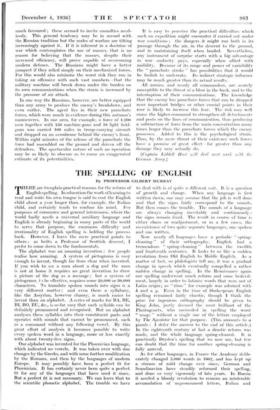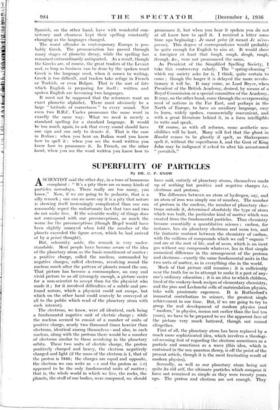THE SPELLING OF ENGLISH
By PROFESSOR GILBERT MURRAY
The alphabet was an amazing invention : few people realise how amazing. A system of pictograms is easy enough to invent, though far from clear when invented. If you wish to see a man about a dog and the man is not at home it requires no great invention to draw a picture of the dog as a message ; but a system of .pictograms; t a be effective, requires some 20,000 or 30,000 characters. To translate spoken sounds into signs is a very different matter ; and even there a syllabary, like the Assyrian, however clumsy, is much easier to invent than an alphabet. A series of marks for BA, BE, BO, Eli, &c., is so far easy that each syllable can be definitely pronounced and recognised. But an alphabet analyses these syllables into their . constituent parts and operates with sounds that cannot be pronounced, such as a consonant without any following vowel. By this great effort of analysis it becomes possible to write every spoken word in a language, more or less exactly with about twenty-five signs.
• Our alphabet was invented for the Phoenician language, which indicated no vowels. It was taken over with due changes by the Greeks, and with some further modification by the Romans, and then by the languages of modern Europe. It may. possibly have. been a perfect fit for Phoenician. It has certainly never been quite a perfect fit for any of the languages that have used it since. But a perfect fit is not necessary. We can leave that to the scientific phonetic alphabet. The trouble we have to deal with is of quite a different sort. It is a question of growth and change. When any language is first written down, one may assume that the job is well done and that the signs fairly correspond to the sounds. But then comes the trouble. The sounds of a language are always changing inevitably and continuously : the signs remain fixed. The result in course of time is either chaos or readjustment, or in a few cases, the co-existence of two quite separate languages, one spoken and one written.
Now nearly all languages have a periodic " spring- cleaning " of their orthography. English had a tremendous " spring-cleaning " between the twelfth and fourteenth centuries. It looks to us like a sudden revolution from Old English to Middle English. As a matter of fact, so philologists tell me, it was a gradual change in speech which eventually compelled a rather sudden change in spelling. In the Renaissance again our spelling underwent much reform and some bedevil- ment, largely in order to latinise words that were not of Latin origin; as "rime" for example was adorned with h and a y. Even in the time of Shakespeare English spelling remained fairly chaotic, though I think the prize for ingenious orthography should be given to King John, justly deemed the most brilliant of the Plantagenets, who succeeded in spelling the word " usage " without a single one of the letters employed by The Spectator for that purpose. (This amounts to a puzzle : I defer the answer to the end of this article.) In the eighteenth century at last a drastic reform was made, and the whole language spring-cleaned. It is practically Dryden's spelling that we now use, but few can doubt that the time for another spring-cleaning is fully arrived. As for other languages, in France the Academy delib- erately. changed 5,000 words in 1602, and has kept up a stream of mild change ever since. German and Scandinavian have steadily reformed their spelling, and done so very vigorously of late .years. In Russia it needed a bloody revolution to remove an intolerable accumulation of unpronounced letters. Italian and Spanish, on the other hand, have with wonderful con- sistency and clearness kept their spelling constantly changing as the languages changed.
The worst offender in contemporary Europe is pro- bably Greek. The pronunciation has passed through many stages of phonetic decay, while the spelling has remained extraordinarily antiquated. As a result, though the Greeks are, of course, the great traders of the Levant and, as long as business can be done by the spoken word Greek is the language used, when it comes to writing, Greek is too difficult, and traders take refuge in French or Turkish, or even Bulgar. That is the sort of fate which English is preparing for itself : written and spoken English arc becoming two languages.
It must not be supposed that the reformers want an exact phonetic alphabet. There must obviously be a large " latitude of correctness " to every sound. Not even two B.B.C. Uncles pronounce the same word in exactly the same way. What we need is merely standard spelling for a standard language. It would be too much, again, to ask that every sound should have one sign and one only to denote it. That is the case in Italian ; when you hear an Italian word you know how to spell it : when you see the word written you know how to pronounce it. In French, on the other hand, when you see the word written you know how to pronounce it, but when you hear it spoken you do not at all know how to spell it. I received a letter some time ago beginning : Je niant price (it meant Je Went- presse). This degree of correspondence would probably be quite enough for English to aim at. It would show a foreigner at least that bough, cough, dough, rough, through, &e., were not pronounced the same.
As President of the Simplified Spelling Society, I take this controversy calmly. The " spring-cleaning " which my society asks for is, I think, quite certain to come ; though the longer it is delayed the more revolu- tionary it will be. It may come, as Lord Bryce, when President of the British Academy, desired, by means of a Royal Commission or a special committee of the Academy. It may, on the other hand, come through the overpowering need of nations in the Far East, and perhaps in the North of Europe, to have an auxiliary language, easy to learn, widely spoken, commercially convenient, and with a great literature behind it, in a form intelligible to write and speak.
Of course, as with all reforms, some aesthetic sen- sibilities will be hurt. Many will feel that the ghost in Hamlet ceases to be ghostly if spelt, as Shakespeare spelt it, without the superfluous h, and the Cost of King John may be indignant if asked to alter his accustomed " vowzitch."





















































 Previous page
Previous page